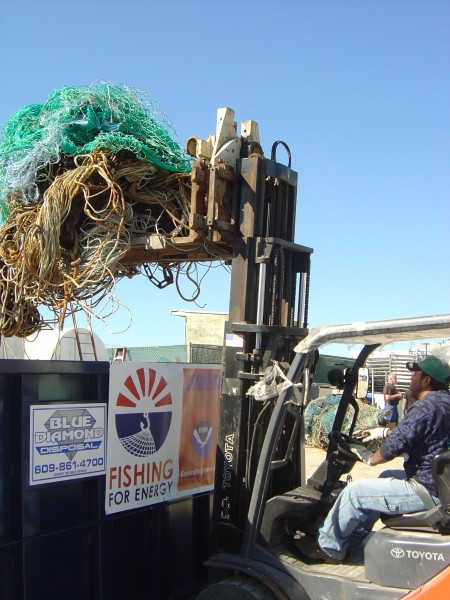Today, NOAA Marine Debris Program partner, the National Fish and Wildlife Foundation (NFWF), announced ten grants totaling $1,157,788 that will support the removal and disposal of an estimated 330,000 pounds of derelict fishing gear. Derelict fishing gear is defined as fishing gear that is lost, abandoned, or otherwise discarded in the marine environment. This year’s grantees will remove gear from the coastal waters of California, Connecticut, Florida, Hawaii, Maine, Massachusetts, Virginia, and Washington – including two National Marine Sanctuaries.
Eight of the ten Fishing for Energy grants are supported with NOAA funds. The grants will also support research into new technologies to reduce the harm from gear when lost or discarded at sea, as well as management efforts to remove gear from critical habitat for endangered species such as the Northern Right Whale.
The Marine Debris Program collaborates with NFWF, as well as with Covanta, and Schnitzer Steel Industries in the Fishing for Energy partnership that prevents and reduces the impacts of derelict fishing gear on the marine environment. Modeled after Hawaii’s Nets to Energy program, the partnership installs collection bins that provide the fishing community with a no-cost option for disposing of old or unwanted gear and funds removal projects, such as with these new grant awardees.

Since its inception in 2008, the Fishing for Energy partnership has grown to provide removal services at 58 ports in 13 states, collecting over 4 million pounds of fishing gear. Gear collected at these ports is first sorted at Schnitzer Steel Industries for metals recycling, and the remaining non-recyclable plastic material is processed and converted into energy at Covanta Energy locations.
Why is this important? Derelict fishing gear is a big marine debris problem. Derelict gear like nets, traps and lines, when left in the marine environment, can continue to trap, entangle, and potentially kill marine life like crabs, fish, sea lions, and sea turtles, smother fragile habitats like coral reefs and seagrass beds, and act as a hazard to navigation for fishing and recreational vessels. The Fishing for Energy partnership helps reduce the amount of derelict gear in U.S. waters and serves as an innovative solution to address this global problem.
To learn more about the FY19 projects visit the Marine Debris Program’s Fishing for Energy website.
